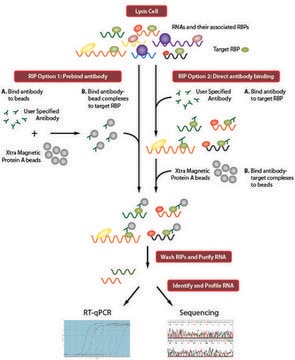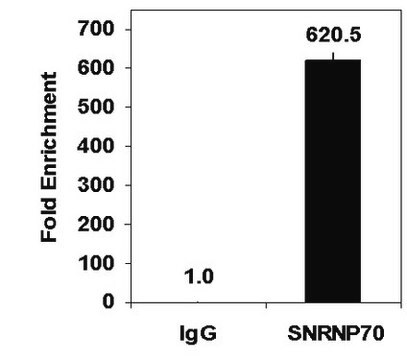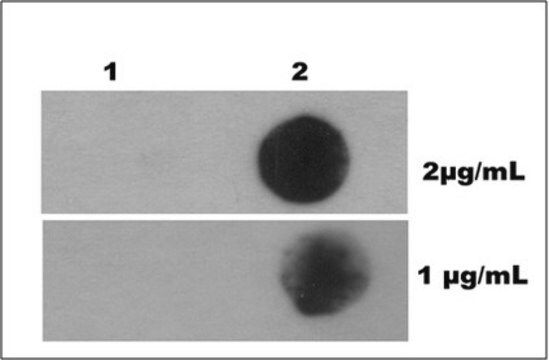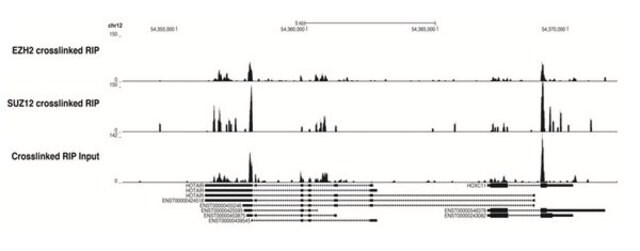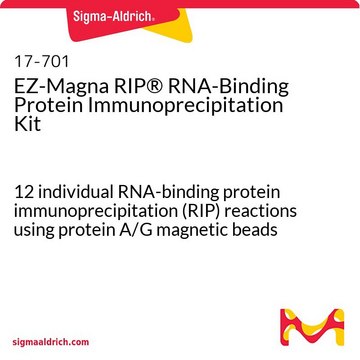17-10499
Magna MeRIP m6A Kit- Transcriptome-wide Profiling of N6-Methyladenosine
Synonym(s):
Magna MeRIP m6A Kit, m6A Profiling Kit
Sign Into View Organizational & Contract Pricing
All Photos(1)
About This Item
UNSPSC Code:
41105331
NACRES:
NA.84
Recommended Products
Quality Level
General description
N6-methyladenosine (m6A) represents an abundant RNA modification that is conserved across many different species, ranging from plants, to yeast, to mammals. Similar to the 5-methylcytosine (5-mc) modification of DNA, m6A is a reversible chemical modification of RNA. m6A RNA modifications are an emerging topic in controlling cell fate transitions in mammalian embryonic stem cells. m6A is one of the most prevalent modifications on both mRNAs and noncoding RNAs in eukaryotes with an estimated 12,000 m6A sites in over 7,000 genes. The mark is deposited by a heterodimer of methyltransferase-like 3 and 14 (Mettl3 and Mettl14) and can be removed by the RNA demethylase enzymes FTO and ALKBH5. Obesity risk gene FTO encodes the first identified m6A demethylase. Mutations in FTO have been associated with increased risk for obesity and type II diabetes. Recently, impairment of the status of m6A regulation has lead to prolonged expression of Nanog in ES cells and the inability to exit self-renewal stages toward differentiation.
Methylated (m6A) RNA immunoprecipitation (MeRIP) is a method to monitor the status of m6A and map the location of m6A RNA modifications transcriptome-wide. The Magna MeRIP M6A Kit uses the MeRIP method to enable identification and transcriptome-wide profiling of m6A RNA modifications. In the MeRIP assay, RNA is chemically fragmented into 100 nucleotides or smaller fragments followed by magnetic immunoprecipitation with a monoclonal antibody toward m6A. After immunoprecipitation, isolated RNA fragments can be subjected with qRT-PCR or RNA sequencing (MeRIP-seq). The streamlined protocol is easy to process and can produce results with high SN ratios.
Methylated (m6A) RNA immunoprecipitation (MeRIP) is a method to monitor the status of m6A and map the location of m6A RNA modifications transcriptome-wide. The Magna MeRIP M6A Kit uses the MeRIP method to enable identification and transcriptome-wide profiling of m6A RNA modifications. In the MeRIP assay, RNA is chemically fragmented into 100 nucleotides or smaller fragments followed by magnetic immunoprecipitation with a monoclonal antibody toward m6A. After immunoprecipitation, isolated RNA fragments can be subjected with qRT-PCR or RNA sequencing (MeRIP-seq). The streamlined protocol is easy to process and can produce results with high SN ratios.
Application
The Magna MeRIP m6A Kit streamlines the MeRIP (Methylated RNA Immunoprecipitation) method to enable identification and transcriptome-wide profiling of m6A (N6-methyladenosine) RNA methylation sites. Suitable for MeRIP-Seq and qRT-PCR of methylated RNA transcripts.
Components
RNA Fragmentation Buffer 10X (0.5 mL);0.5M EDTA (0.5 mL);IP Buffer 5X (15 mL);Magnetic Beads A/G Blend (315 μL);Anti-N6-methyladenosine (m6A), clone 17-3-4-1 (100 μg);RNase Inhibitor (90 μL);N6-Methyladenosine, 5′-monophosphate sodium salt (m6A) (10 mg);Normal Mouse IgG (125 μg);MeRIP Primers Human EEF1A1 Positive (75 μL);MeRIP Primers Human EEF1A1 Negative (75 μL)
Disclaimer
Unless otherwise stated in our catalog or other company documentation accompanying the product(s), our products are intended for research use only and are not to be used for any other purpose, which includes but is not limited to, unauthorized commercial uses, in vitro diagnostic uses, ex vivo or in vivo therapeutic uses or any type of consumption or application to humans or animals.
Signal Word
Warning
Hazard Statements
Precautionary Statements
Hazard Classifications
Aquatic Chronic 3 - Eye Irrit. 2 - Skin Irrit. 2
Storage Class Code
10 - Combustible liquids
Certificates of Analysis (COA)
Search for Certificates of Analysis (COA) by entering the products Lot/Batch Number. Lot and Batch Numbers can be found on a product’s label following the words ‘Lot’ or ‘Batch’.
Already Own This Product?
Find documentation for the products that you have recently purchased in the Document Library.
Our team of scientists has experience in all areas of research including Life Science, Material Science, Chemical Synthesis, Chromatography, Analytical and many others.
Contact Technical Service